Days before Russia invaded Ukraine, I received a note from Ruslin Maliuta — an associate also involved in leadership in the WEA — from Kyiv, who said, “I think we are going to need your help.” And so right he was. Days later, Putin invaded.
A few days later, a group of Canadians — in Florida for the winter — triggered a fund for Ukraine, and asked me to make sure it helped those in need. I asked Ruslin to head it up and our WEA office put in place means by which that could happen.
Last month (April) Ruslin and I met with church leaders in countries alongside Ukraine, churches and ministries helping Ukrainian refugees fleeing the war. Here are some reflections and encounters from Monday to Friday.
Monday
I began today in Kraków, a beautiful city of 1 million about an hour from Ukraine border. A university city, remarkable in its structure and important in its role in Poland. I began at a church called Church for the City, a mega church, with 250 attendance. Poland has a very small Evangelical community with maybe 3 to 400 churches.
The Sunday after Russia invaded, a man came to the pastor, whom he had never met, and said; I have a hotel about an hour from here and you may want to consider using it for refugees. On the very day refugees were pouring over the border the church was praying to consider what they could do.
In the end, this church now has over 1000 refugees, mostly women and children, in three locations. They provide refugees, longer-term than just a few nights, giving them time to decide whether they’re going to go back into Ukraine or to move into a new location. But the lifting of anxiety about where they’re going to go in the next few nights, is of enormous value to mothers and children.
I spent time interviewing mothers and playing with children. I confess my heart broke as I saw the tragedy of families torn apart, mothers struggling to explain to children what was going on. Oh the tragedy of evil, when the bruised ego of a man becomes means by which peoples’ lives are destroyed.
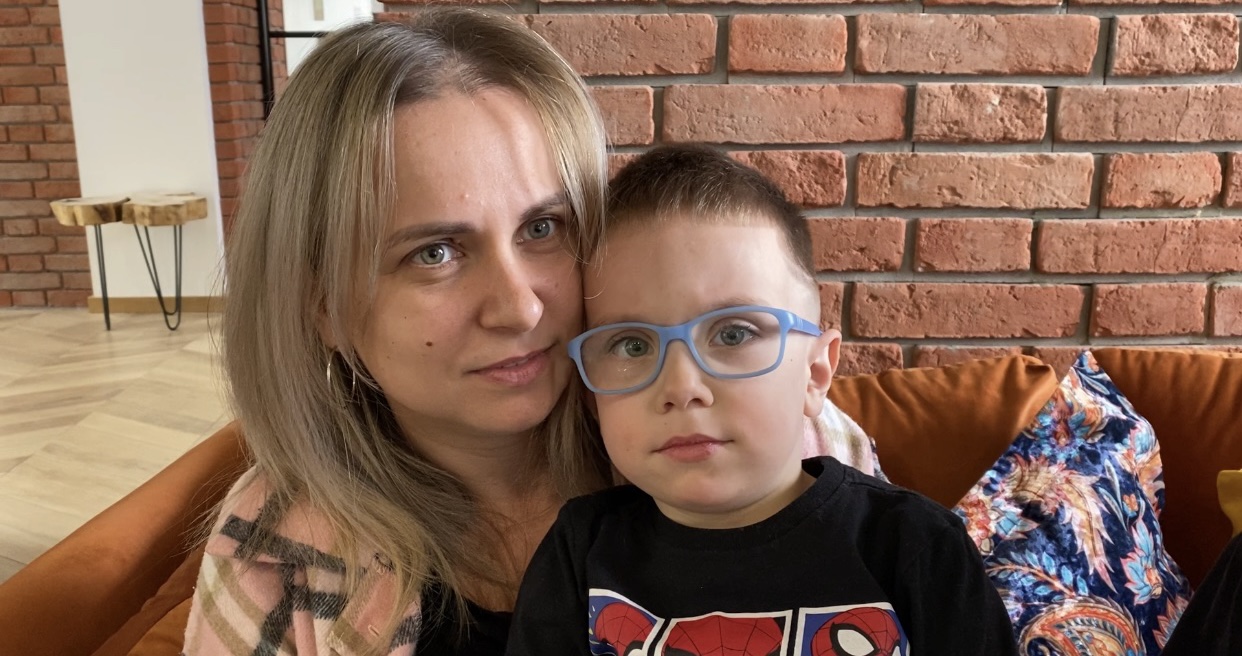
But in the midst of this, grace is a living measure, hope rises in the darkness of despair, and the love of Jesus is manifest in the hearts and lives of people who become the hands and feet of Jesus.
Tuesday
I walked into a plain two-story building, on the edge of Warsaw Poland today, turned a corner and there at the back was a large warehouse, a busy forklift moving cases into a semi truck.
This distribution center has already sent two million dollars in supplies, deep into Ukraine, providing food, medicines, toiletries and toys for children.
The manager, a pastor, with a rich history — converted from a life of crime — had this place humming. This was the 50th semi truck he was sending out. In a 500 km overnight drive, it would arrive at one of 6 hubs in Ukraine from which distribution would move out into the community.
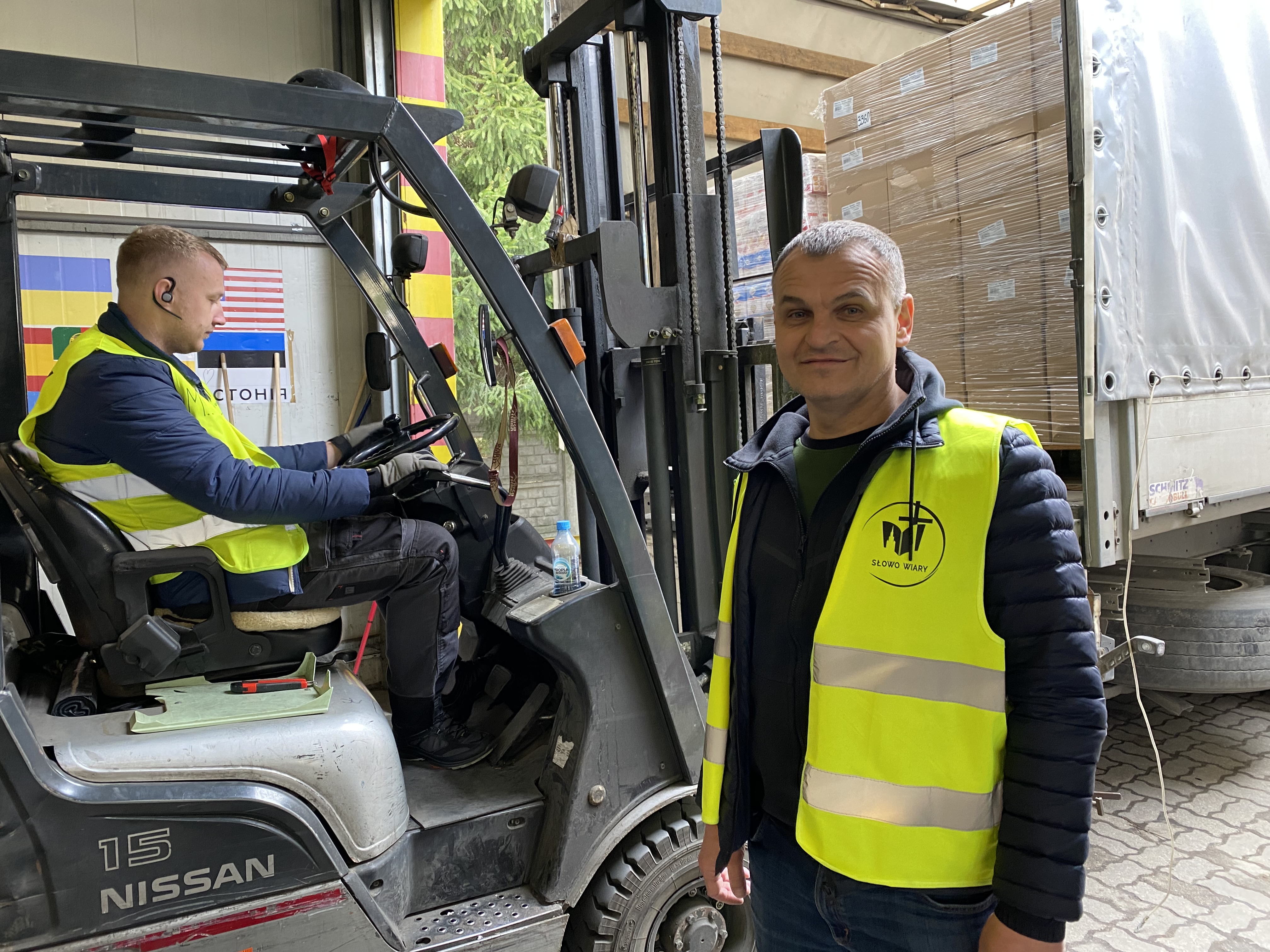
I watched a mother and her children, find toys including a little doll, so treasured especially when you’ve had to run for your life and left your home behind with its clothes and household supplies we all take for granted.
Five weeks ago, this place didn’t exist. Today it’s salvation for many. Made possible by gifts from Christians in Europe and North America, these remarkable people collect, sort, package, select and distribute into the war scarred land of Ukraine.
The senselessness of this war staggers my imagination. The brutality of national ego has no time for the child or mother or father or grandparent. It sees only itself. But here today, as Pentecostal churches in true entrepreneurial form, trusting the Spirit to supply, are opening doors and creating means by which people feel the heartbeat of the risen Savior, who just this last Sunday, we celebrated.
You hear joy and celebration here in the Distribution Center. Jesus and his resurrection is celebrated with every truck rolling out, across the border headed to somewhere in the Ukraine. I feel the thrill of knowing the little part each of us play in making it work.
Wednesday
A small Baptist church in a majority Catholic country seemed so insignificant. Yet here in Budapest, a few hours drive from the Ukraine border, a small congregation is opening their arms to Ukrainians fleeing their land.
11 million displaced people — 4 1/2 million have left and 7 remain — is a number too big to comprehend: more than anything since the WWII. What then can a small Baptist Church do?
It didn’t take me long to find out. Courteous and happy, the pastor hugged and welcomed me. This congregation of 40 members decided on the Sunday after February 24 they would do something. I’ll get to that but first let me introduce you to a family of six: mom and her five children.
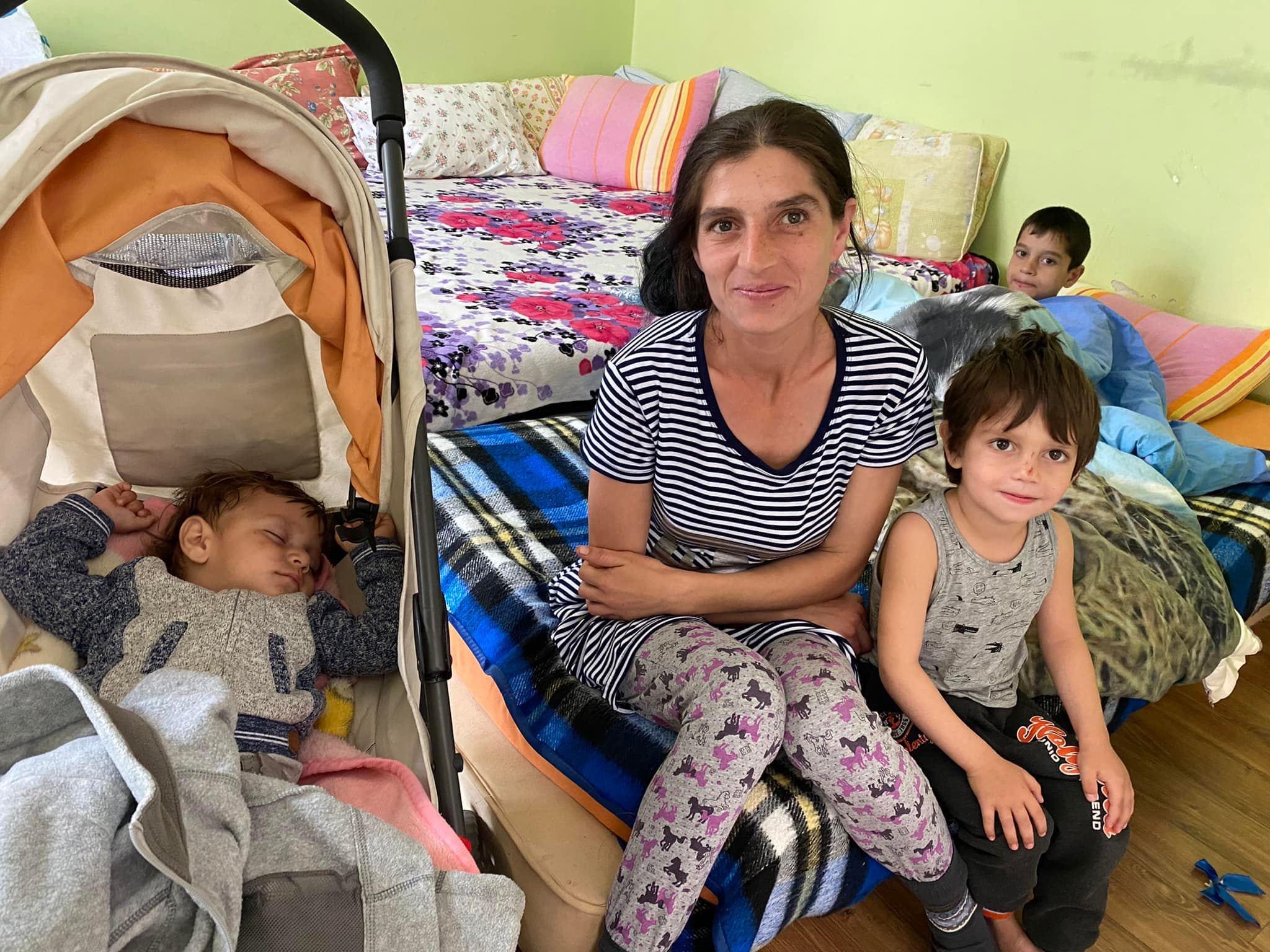 Of the 570 refugees this church has cared for in the past five weeks, this little family is roomed in the basement of the church. A baby is in the stroller, two are playing and two under the covers: unwell. I asked the mother if I could pray and in my tear-ladened voice, I did just that. I didn’t know where the father/husband was, but what I did know was this little family is surrounded by love and protection. I asked if I could take a picture and show them to you and she said I could.
Of the 570 refugees this church has cared for in the past five weeks, this little family is roomed in the basement of the church. A baby is in the stroller, two are playing and two under the covers: unwell. I asked the mother if I could pray and in my tear-ladened voice, I did just that. I didn’t know where the father/husband was, but what I did know was this little family is surrounded by love and protection. I asked if I could take a picture and show them to you and she said I could.
I’m visiting churches in countries west of Ukraine. I’ve seen the large ministries at work but I wanted to see what a local church was doing. There are only a few hundred evangelical churches in Hungary.
Hungarians and Ukrainians have had their differences, but when this church heard of the war they went to work. They began by meeting those fleeing, right at the border. Their members housed the families, mostly mothers with children. Then they requisitioned an empty building nearby to store goods, food, medicines.
What strikes you when you hear their stories is the debilitating presence of fear; they hear of women being raped, which leads them to ask, who do I trust? Traumatized by bombing of their homes, they run for a train or bus, alone with their children, as their husbands, by government mandate, are sequestered to stay in country and fight.
It’s to these fearful and anxious families members that this Baptist church said “we love you.”
Major organizations are at work. But I wanted to see those who simply respond to need out of a loving heart. This story can be replicated across Poland, Hungary, Slovakia, Romania and Moldova where people give without help, without guidance, without rules or regulations, but simply go to the border, put their arms around those frightened, taking them, assuring them of trust and care.
What speaks of the power of the gospel? Jesus was unequivocal: ‘Truly I tell you, whatever you did for one of the least of these brothers and sisters of mine, you did for me.’
Matthew 25:40
Most who read this will know where you’ll sleep tonight. Noise of bombs are only as close as your tv news. It is impossible to imagine what it’s like for a mother with her children to be at the mercy of strangers.
What I can tell you is that Christian sisters and brothers are acting in our place loving the stranger. Our part in this action plan is to help them with our resources.
Let your heart feel joy as you give more generously than you’ve ever imagined. There are a number of organizations that you can trust who will wisely take your funds for the care of people.
I pray you will know the power and resilience of faith as you enable someone, somewhere in this war-torn region, to be your hands and your heart helping parents and children survive and thrive in the midst of this calamity.
Thursday
If you were to start up a ministry overnight, I think you’d want John Lubas to head it up. It took me little more than a minute to be captured by his vision energy and flat-out love for Ukrainian refugees. It wasn’t hard for me to see how he was able to get UBC’22 – a new operation to help Ukrainian refugees in Romanian – up and running within hours.
John and Roxi pastor the Holy Trinity Baptist Church in downtown Bucharest Romania. The day Russia invaded Ukraine, he called pastor friends (Feb 24th) and asked what they could do? First, they’d ask their congregations on Sunday the 27th. Then they’d reconnect Wednesday and discuss plans. The problem was, by 8 o’clock Monday morning 10 Ukrainians were standing in front of the church asking for help and by the evening that number was 60.
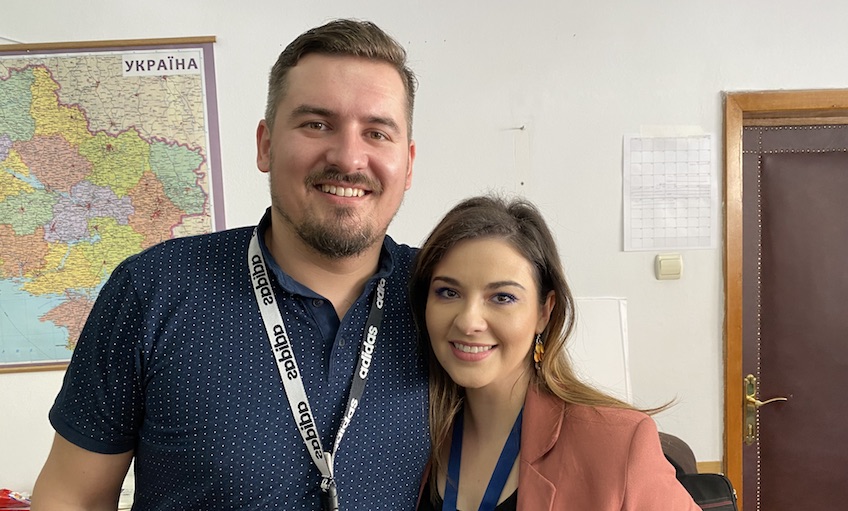
Five weeks later pastor John has five refugee centers operating plus a hotel. They’ve assembled 800 volunteers, they care for 350 people every night–– bed, food, medical care. To date they’ve cared for 1800 Ukrainians and processed another 4000, guiding them to other centers or getting them transportation to cities and countries in Europe.
The church is a bit of madhouse: filled with beds, rooms redesigned as kitchens and bathrooms, new cupboards built to store food for local guests and to stock their daily runs in Ukraine, as their 11 vans and four pickup trucks carry in supplies.
This all started with no money and no promise of funds. While the Romanian government is hospitable, they require keeping records of who is coming and going which created an administrative bottleneck. So, a few IT specialists went to work and within days, defying the odds – it usually takes months to build an app – it was done, tested, and is now fully operational.
This story is one of rescue. A young pastor and colleagues in rapid fire, and with daring and creative impulse, wrap their arms around people they’ve never met, some other faiths and overnight build an organization.
Over the last few weeks, we’ve raised a couple of million dollars to help those displaced within Ukraine, and to help refugees spread out into Poland, Hungary, Slovakia, and Romania. I have just come from those countries, and I have witnessed amazing stories.
While operations like UBC’22 step in to help, behind are stories of tragedy and need. So let me share this story told by one of the ministries our WEA fund is helping, told by Mykola Kuleba, of Save Ukraine.
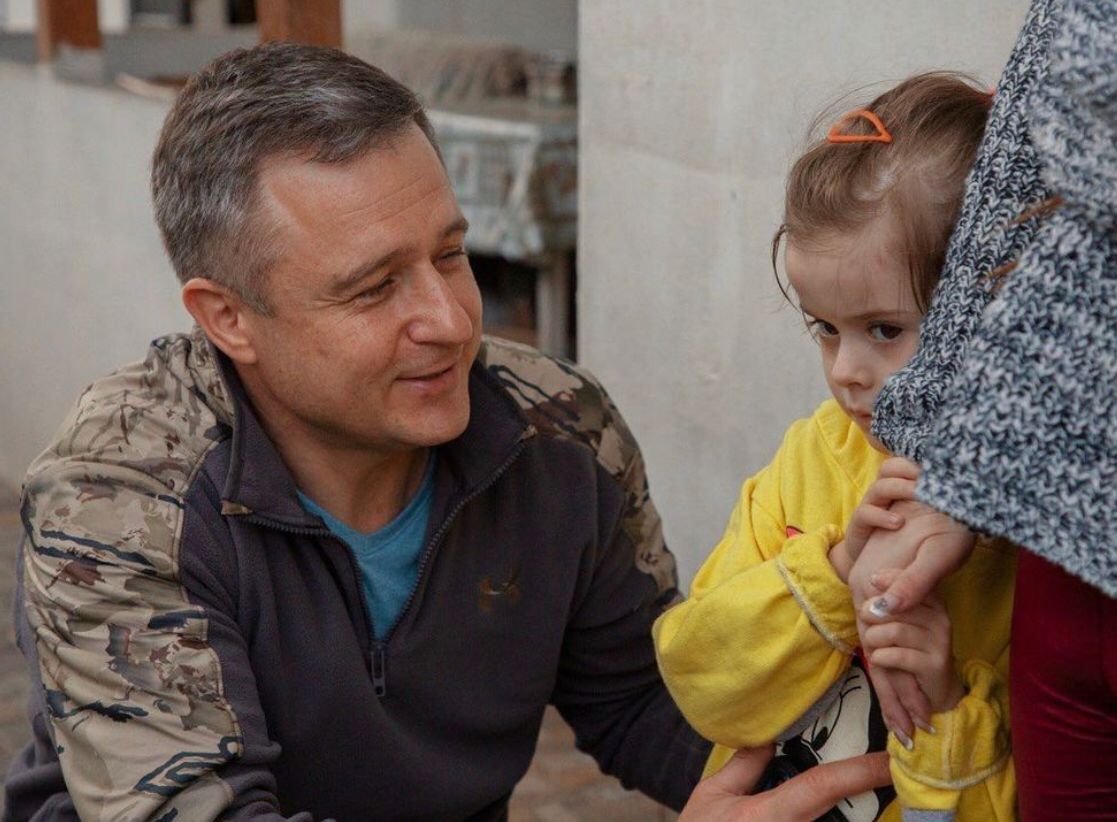
“Veronika spent 50 days underground. She is one of the hundred thousand Ukrainian children who, for 2 months now, have lived in bomb shelters all over Ukraine. They have not seen the light of day. Literally. For those children, spring has not started yet.
“I met his little girl, her mother Katya, and grandma Tetyana in the Kharkiv metro, when I was traveling east to evacuate children from hotspots. Katya told me that on the first day of the war, Russians bombed their residential building. Their apartment was completely destroyed, and with it – all Veronika’s favorite toys and dolls. Then the family was hiding in the basement. After the tragedy, they went down into the nearest metro station.
“Veronika recalled that she was very scared of dying when she heard the loud noises. The girl received psychological trauma – she was hysterically afraid of even coming close to the stairs which lead from the underground station to the surface.
“I met them by accident. We became acquainted, and the family told me their story. After two hours of my begging and arguments, the family, who had lived underground for almost two months, agreed to leave their shelter and go to Kyiv with me.
“I will not forget the moment when the child was going up the stairs. We were all very proud of her and supported her. She held up well, despite her whole body shaking from fear and gripping her mother’s hand. I am proud of this family – however scary it was, they dared to do it, and now they are safe.”
Friday
Rocking back and forth on his heels, a boy, 4 or 5 years of age, alone, was softly singing a song from his homeland of Ukraine, his body moving slowly to the tune. I saw him just as I was leaving a refugee center in Romania.
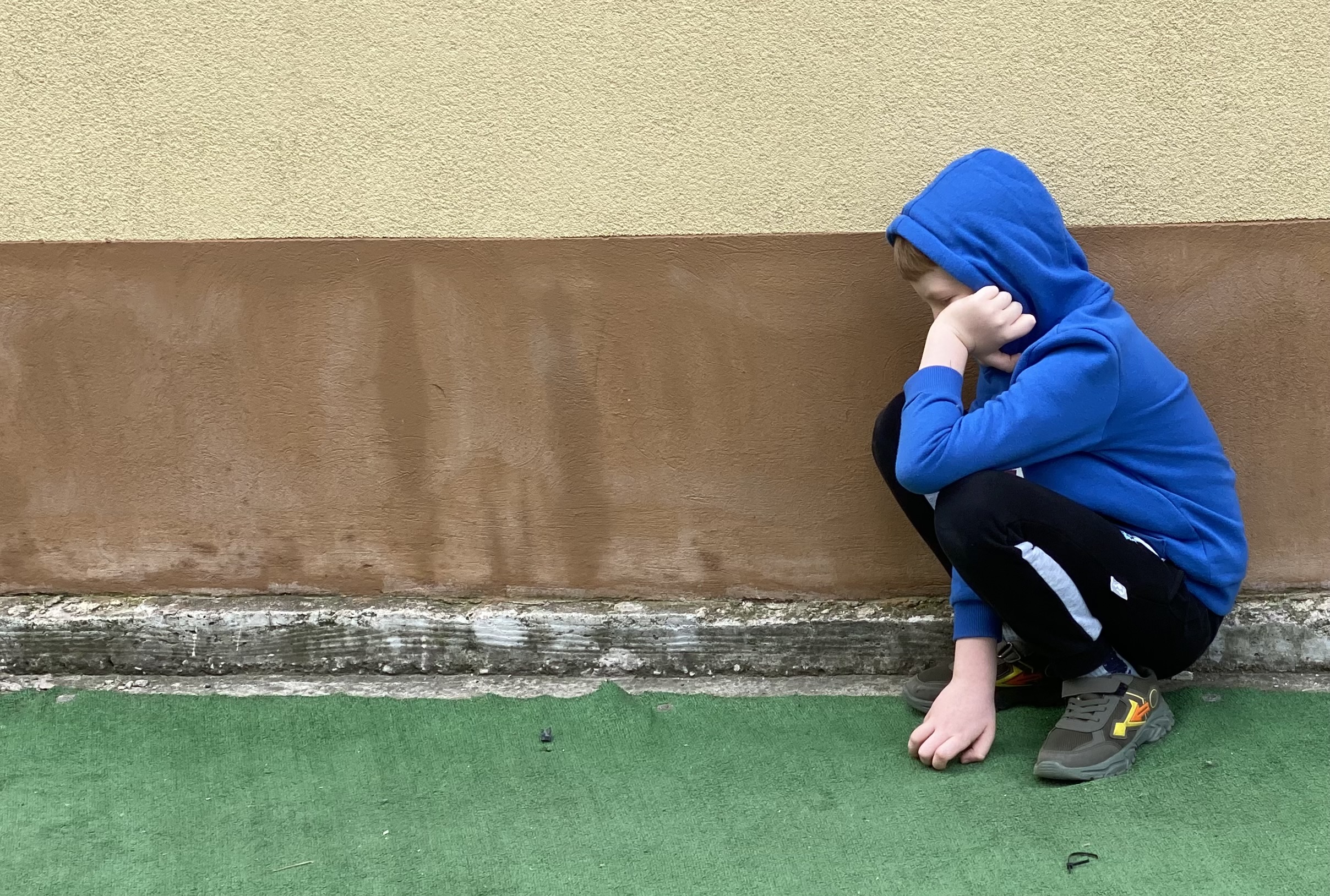
All week WEA discipleship leader Ruslan Maliuta – himself from Kyiv – and I met refugees from Ukraine in countries to the west: Poland, Hungary, Slovakia, and Romania. We watched as semi-trucks and vans pulled up to be loaded, then head east to deliver needed food, medicines, and water to those who were cloistered in subway halls, stuck under buildings in rubble, or hiding inside bathrooms of houses, praying all the while that missiles and bombs would not reach them.
We sat with mothers and children waiting in homes and refugee centers, as they wondered if they would ever see their husbands and fathers again. They so wanted to return to their home and friends, even while silently brooding over what they feel is a brutal betrayal by their fellow Slavs (and in many cases extended families) to the east. The cloud of evil hung over the greatest of optimists. The flagrant abuse of territorial integrity and personal well-being has turned this part of the world upside down.
My young singing friend, dressed in a blue jacket with a hoodie, took hold of my heart and, in one moment, epitomized the wider horror we will forever remember as “2022 – the year of Ukraine.” Just imagine this boy and his mom, days before fleeing Ukraine, leaving behind husband and dad. Friends, the glue to a boy’s world, were now nowhere to be seen. His hometown, a place of safety and well-being, had been bombed. Every notion of security and normalcy shattered. School a memory, books and toys left behind. Even the language is different. Eating other people’s food just isn’t like mom’s. At night he looks into his mom’s eyes, and as much as she will try to even out the bumps and show strength, he can see her fear and uncertainty. Yes, his life will never be the same again.
Another story from Ukraine captured the enormous emotional as well as physical dislocation that war brings. A family, a mother and two daughters, arrived at a refugee center, and in working out details, the center director noted that the girls were agitated and distressed. He asked the mother if there was something she could explain.
She said that two days earlier, as they were running for a bus to leave Ukraine, another mother and baby joined them. Amidst the crowding and confusion of soldiers and shouting of orders, a Russian soldier took the baby from its mother, put a bullet through its head, and handed the bloody child back to the mother. The other mother with her two girls watched it all, a searing memory, never to be forgotten.
Amidst all this horrible suffering, angels of mercy welcome those on the run, offering a home, friendship, food and counsel for the journey. These agents of love walk streets where fear reigns, bringing protection and solace. Strong hands treat wounds. Men and women leave their comforts and, like the Good Samaritan of Jesus’ story, go where wounded people need the loving presence of friendship. Everywhere we went, people were giving and helping,
But it didn’t take long for supplies to run out, and just when money was needed to replenish supplies, Christians in Canada asked me, “Here is some money, can you make sure it goes to those in need?” Their generosity was instant and without request. They were moved by the desperate need, and their faith and concern launched a special fund. We formed TRUST (The Response-Ukraine Special Taskforce), and with funds from these businesspeople we branched out, now receiving funds from Europe, the United States and Asia as well.
you look at my little friend hunched over, singing his song, hear that inner voice: your gift will become your voice speaking to him. Your gift is as if you were there, helping his mother find enough for the evening meal. Or see it another way: your funds will put fuel into a marked church van that a mother and her children can trust, offsetting fears of predatory sex traffickers.
All week Ruslan and I looked over budgets, examined plans, and watched renovations being made to serve people on the move. We worked alongside marvelous people who are doing exactly what Jesus has called us to do. But nothing captured the tragedy and sorrow of a war with no rationale or purpose better than the young boy singing. In the wake of rumbling tanks and ear-splitting bombs, some 6 million displaced children, their lives uprooted and forever scarred, need us.
May we help this song of lament, in time, to turn to a song of joy.
Brian C. Stiller
Global Ambassador, World Evangelical Alliance
May 2022
Author:
Brian Stiller